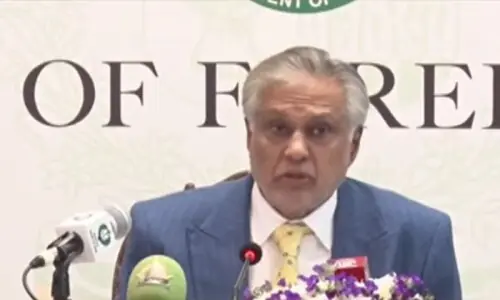RECENT statements from Prime Minister Imran Khan and his ministers have outlined fairly clear plans to address Pakistan’s macro-economic challenges. Even if all goes well, economists project that, due to financial constraints, Pakistan’s economic growth will remain between 3 to 4.5 per cent during the next two to three years.
The rate of GDP growth is, however, secondary to the central mandate of the PTI government ie to improve the quality of life of the vast majority of the poor and deprived in Pakistan for whom, to quote Hobbes, life is “nasty, brutish and short”.
Despite lower GDP growth, the PTI can and should devote most of its limited financial and administrative capital to addressing the basic needs of this disadvantaged majority.
The PTI should devote most of its financial and administrative capital to addressing the people’s basic needs.
The issues which affect the quality of life of the ‘common’ Pakistani are, in rough order of priority: security and safety; justice; food and water; healthcare; housing; education; electricity; sanitation and pollution; and urban and rural transportation.
Security and safety: Since the launch of Zarb-i-Azb by the Pakistan Army, the security situation on the country’s frontiers and urban centres has improved exponentially. Cross-border terrorism can be best resolved through the elimination of the Tehreek-i-Taliban Pakistan and the Balochistan Liberation Army, and a sustainable peace settlement in Afghanistan. And preventing violence by religious extremists and criminals will require effective implementation of an updated version of the National Action Plan.
Justice: Progress has been made in addressing corruption and promoting the rule of law due to the ‘activism’ of the chief justice and the Supreme Court. However, there are enormous, everyday challenges that confront the weak and vulnerable in Pakistan. For example, the capture (qabza) of rural and agricultural properties and the economic exploitation and extortion by local landlords, police and other officials must be addressed through effective and independent investigations and the provision of speedy justice.
Food and water: Pakistan’s core problem is not a shortage of food, but its affordability and efficient distribution. Mechanisms are needed to prevent price manipulation by middlemen. There are pockets of poverty (Thar, former Fata region, Balochistan tribal areas) where the federal and provincial governments have a clear responsibility to provide food and/or financial support to eliminate hunger and ensure adequate nutrition, especially for mothers and children (and suppress the corruption which subverts such support).
Clean drinking water is emerging as a major challenge. There is a dire need of dams for water storage and treatment plants to provide clean drinking water for cities, towns and villages. The wanton pollution of the country’s rivers and water channels must be criminalised and halted. Desalination plants are needed in Gwadar and may soon be required to meet Karachi’s water requirements.
Healthcare: Government-owned healthcare facilities in Pakistan are insufficient, underfunded, disorganised and riven by corruption. These must be reformed, perhaps by ‘privatising’ their management. The majority of the people need primary healthcare which can be provided by a vastly expanded network of local and accessible clinics (in rural villages and urban neighbourhoods), with smaller hospitals in the towns and larger ones in the cities. The best strategy may be to combine private care for those who can afford it, with publicly financed care for the poor, including under the government’s proposed health card scheme. In this model, the network of healthcare facilities could be set up through public-private partnerships.
Housing: The prime minister has announced an ambitious plan to construct five million low- and middle-income homes over the next five years. The plan has yet to be fully elaborated. Financing will be the main problem. The Government cannot afford to meet all the costs. Mortgage finance at 14pc to 15pc will be unaffordable for the poor and the lower middle class. The solution may be again a public-private structure, eg to combine revenues from high income/luxury housing projects to subsidise mortgage interest for low-income housing.
Education: Universal literacy and the acquisition of knowledge and science will be vital for Pakistan’s prospects for rapid and sustained development. However, the immediate priority of the average Pakistani is the acquisition of a skill set which can provide employment. Thus, the government’s urgent objective should be to set up multiple vocational training centres to impart various identified skills to as many people in the ‘workforce’ as possible. These should be financed and organised by both the government and industry/ business groups which require these skills.
Electricity: Pakistan is now within sight of meeting its power generation requirements. The next challenge is to ensure that every household in the country is electrified within the next few years. This will require the extension of electricity grids and provision of solar and wind energy, including rooftop solar installations, in off-grid areas. A strategy to promote renewable energy, including hybrid solar and wind energy parks, appears urgent.
Sanitation and pollution: Federal, provincial and local authorities must assume the responsibility to address the rising challenge of sanitation and pollution. This includes the disposal and treatment of the 10,000 tons of solid waste produced in Karachi every day; the treatment of industrial sewage that is poisoning Karachi’s ports and sea coast; and the vehicular emissions and combustion of agricultural waste which shroud Lahore and northern Punjab in smog each winter. The government’s financial burden could be reduced by taxing polluters, setting up waste-to-power plants and securing international funding.
Urban and rural transportation: The availability of reliable and affordable transport can significantly ease the daily misery of millions of poor and middle-class Pakistanis. If appropriately structured, such transport facilities can be built through public-private partnerships.
Apart from the moral imperative, there are three compelling reasons for the government to accord priority to addressing quality-of-life issues. First, it is smart electoral politics to secure the support of the vast majority. Second, sustained industrial development and economic modernisation will not be possible without an educated, healthy and income-generating workforce. Third, improving the quality of life of Pakistan’s people will help to contain extremism, criminality and social discord. It will promote the rule of law, patriotism and the security of the Pakistani state.
The writer is a former Pakistan ambassador to the UN.
Published in Dawn, January 6th, 2019





























